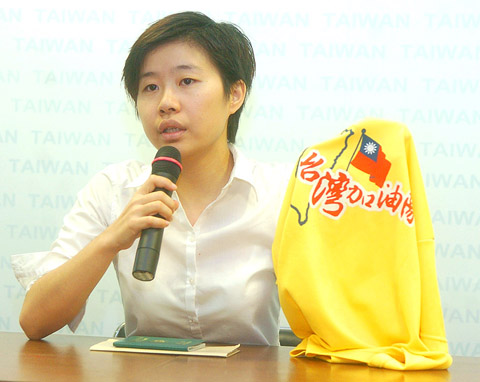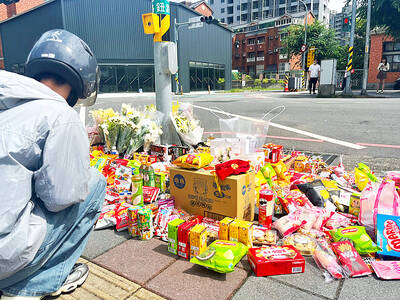Yang Hui-ju (楊蕙如), the captain of a cheerleading squad who was refused entry in Beijing on Saturday, said yesterday she regretted the Taiwanese government had not given her any support over the incident.
“Where was the Taiwanese government when a Taiwanese was treated unfairly outside the country,” Yang told a press conference.
Chinese authorities on Saturday refused Yang’s entrance to Beijing on her way to cheer the Taiwanese team at the Olympics.

PHOTO: WANG MIN-WEI, TAIPEI TIMES
“I was not going to Beijing to provoke anyone or make any trouble. I was only going to cheer for Taiwanese athletes,” Yang said.
She said the cheerleading squad had initially intended to wear yellow uniforms bearing the Taiwanese flag and the English slogan: “Taiwan Woo!” but later substituted the flag with the Olympic rings.
She said she had rejected requests for interviews before her departure to keep a low profile and that she does not look like a “terrorist.”
Yang took exception to Chinese Nationalist Party (KMT) Legislator Wu Yu-sheng’s (吳育昇) remark that she had invited humiliation upon herself, saying: “Is it wrong to bring the nation’s flag to international sports events and hope that the Taiwanese team would not be referred to as Chinese Taipei?”
At a separate event, Democratic Progressive Party Legislator Kuan Bi-ling (管碧玲) said the incident showed “the government’s backbone is as soft as a banana.”
Beijing not only denied Yang’s rights but also insulted Taiwan and its people, Kuan said.
In response, Wu said yesterday that Yang had sought to create a scene at Beijing Airport.
“Basically if you threaten [China] before [leaving for Beijing] and try to politicize a sports event on some level, you’re asking for it,” he said.
The Presidential Office distanced itself from the controversy yesterday, saying government agencies had already made their position clear.
Presidential Office Spokesman Wang Yu-chi (王郁琦) said that the Cabinet and Sports Affairs Council (SAC) had expressed regret over the incident and that their position represented that of the administration.
Wang declined to answer questions about whether Beijing’s move was an act of political suppression, saying he had nothing to add beyond the agencies’ statements.
In addition to the Executive Yuan and the SAC, the Mainland Affairs Council (MAC) on Sunday urged Beijing to respect the rights of spectators, saying the matter could have been handled differently had the Chinese government contacted Taiwan’s emergency response task force in Beijing.
The task force includes officials from the MAC, the SAC, the Straits Exchange Foundation, the Chinese Taipei Olympic Committee, the National Communications Council and the National Security Council.
Meanwhile, MAC Vice Chairman Chang Liang-jen (張良任), who presides over the task force in Taipei, was quoted by the Central News Agency (CNA) yesterday as saying that Taiwanese baseball fans scheduled to travel to Beijing today to cheer for Taiwan’s baseball team in the Olympics “will not likely be rejected entry, as far as I know.”
Chang said that since the Yang incident, Beijing has promised to notify the Taiwanese delegation in Beijing before making any similar decisions, the CNA reported.
Additional reporting by Flora Wang and CNA

Nvidia Corp yesterday unveiled its new high-speed interconnect technology, NVLink Fusion, with Taiwanese application-specific IC (ASIC) designers Alchip Technologies Ltd (世芯) and MediaTek Inc (聯發科) among the first to adopt the technology to help build semi-custom artificial intelligence (AI) infrastructure for hyperscalers. Nvidia has opened its technology to outside users, as hyperscalers and cloud service providers are building their own cost-effective AI chips, or accelerators, used in AI servers by leveraging ASIC firms’ designing capabilities to reduce their dependence on Nvidia. Previously, NVLink technology was only available for Nvidia’s own AI platform. “NVLink Fusion opens Nvidia’s AI platform and rich ecosystem for

WARNING: From Jan. 1 last year to the end of last month, 89 Taiwanese have gone missing or been detained in China, the MAC said, urging people to carefully consider travel to China Lax enforcement had made virtually moot regulations banning civil servants from making unauthorized visits to China, the Control Yuan said yesterday. Several agencies allowed personnel to travel to China after they submitted explanations for the trip written using artificial intelligence or provided no reason at all, the Control Yuan said in a statement, following an investigation headed by Control Yuan member Lin Wen-cheng (林文程). The probe identified 318 civil servants who traveled to China without permission in the past 10 years, but the true number could be close to 1,000, the Control Yuan said. The public employees investigated were not engaged in national

ALL TOGETHER: Only by including Taiwan can the WHA fully exemplify its commitment to ‘One World for Health,’ the representative offices of eight nations in Taiwan said The representative offices in Taiwan of eight nations yesterday issued a joint statement reiterating their support for Taiwan’s meaningful engagement with the WHO and for Taipei’s participation as an observer at the World Health Assembly (WHA). The joint statement came as Taiwan has not received an invitation to this year’s WHA, which started yesterday and runs until Tuesday next week. This year’s meeting of the decisionmaking body of the WHO in Geneva, Switzerland, would be the ninth consecutive year Taiwan has been excluded. The eight offices, which reaffirmed their support for Taiwan, are the British Office Taipei, the Australian Office Taipei, the

DANGEROUS DRIVERS: The proposal follows a fatal incident on Monday involving a 78-year-old driver, which killed three people and injured 12 The Ministry of Transportation and Communications yesterday said it would lower the age for elderly drivers to renew their license from 75 to 70 as part of efforts to address safety issues caused by senior motorists. The new policy was proposed in light of a deadly incident on Monday in New Taipei City’s Sansia District (三峽), in which a 78-year-old motorist surnamed Yu (余) sped through a school zone, killing three people and injuring 12. Last night, another driver sped down a street in Tainan’s Yuching District (玉井), killing one pedestrian and injuring two. The incidents have sparked public discussion over whether seniors